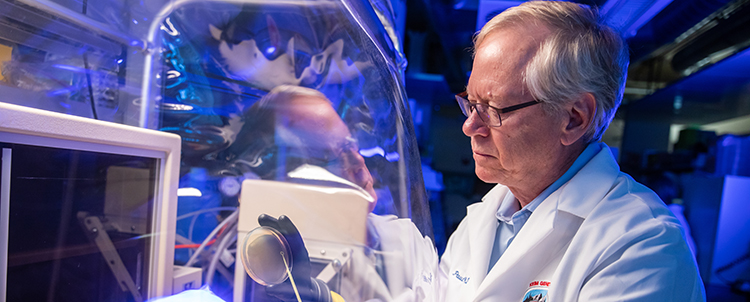
TRIF return on investment for Arizona includes COVID-19 research; committee votes to award $3 million to track variants
Through the Technology and Research Initiative Fund, more than $465 million was generated for Arizona’s economy in 2020, empowering critical research such as crucial new COVID-19 testing to using solar power to extract water out of thin air to medical interventions that may reverse the course of Alzheimer’s disease, and more.
During a meeting of the Arizona Board of Regents Research and Health Sciences Committee, committee members were briefed on the board’s oversight of TRIF, investment areas and impacts of the funds in key focus areas: improving health; water, environment and energy; space exploration and optical science; national security; and higher education access and workforce development. The committee focused on the grand challenges the universities are trying to solve going forward that impact the lives of Arizonans.
TRIF funds support education in high-demand fields, spur new patents, lead to new start-up companies and support a healthy entrepreneurial ecosystem in Arizona. TRIF funding supports the universities developing qualified workers for employers, including engineering expertise for Intel that recently announced a $20 billion expansion and Taiwan Semiconductor Manufacturing Company that is building a chip factory in Phoenix. In coordination with organizations such as the Arizona Commerce Authority and private industries, the universities drive Arizona’s economy forward by filling workforce needs and transferring technology developed at the universities to the private marketplace for the state’s pro-innovation environment.
“You have to constantly be looking at your educational programs to keep them state of the art. When you work with industry partners, they can tell you ‘our employees need x,’ and you add that to the curriculum,” said Sally Morton, Arizona State University Knowledge Enterprise executive vice president.
To further the universities work and impact in addressing the COVID-19 pandemic, the Research and Health Sciences Committee recommended to the full board to approve $3 million in TRIF revenue for the universities collaborative COVID-19 activities and projects, including working to detect, monitor and assess SARS-CoV variants of concern through the Arizona Collaborative COVID Consortium.
“Since we’re a pathogen lab and have been for 25 years, when COVID happened, we jumped in with both feet,” said Paul Keim, Northern Arizona University Pathogen and Microbiome Institute Executive Director. “One of the things we have done and will continue to do in the future is sequence genomes.”
The funding would include genomic sequencing of SARS-CoV positive samples, wastewater monitoring and detecting of variants as well as focusing on reinfection cases, long haulers and those who may come down with the virus despite being vaccinated.
“There are variants of interest, variants of concern and variants of high consequence. All of them are either predicted or demonstrated to have higher transmissibility, higher mortality rates or to some degree to evade COVID acquired immunity or vaccine acquired immunity, or to allow the virus to escape our diagnostic tests,” said Michael Worobey, UArizona Department Head, Ecology and Evolutionary Biology.
A year ago when the COVID-19 pandemic began to impact society, Arizona’s public universities mobilized researchers to fight the pandemic with groundbreaking projects, many of which utilized TRIF funds.
Arizona State University created a clinically certified COVID-19 testing lab in just two weeks and developed the first publicly available saliva-based test in the nation. Northern Arizona University’s Pathogen and Microbiome Institute launched the COVID-19 Testing Service Center and has engaged numerous industrial clients to help test new potential therapeutics for COVID-19. Early warning COVID-19 testing in wastewater at the University of Arizona and collaboration to develop antimicrobial surface coatings to reduce the spread have garnered worldwide attention.
“From unlocking cures for devastating diseases to improving environmental health, protecting national security and creating jobs and strengthening the workforce, TRIF funds have enabled research in key areas for Arizonans for issues that are affecting people’s lives,” said ABOR Research and Health Sciences Committee Chair Regent Fred DuVal. “As we enter into a new era for TRIF in developing the next five-year plans, I look forward to growing private sector collaboration, examining our five focus areas in depth and sharing the incredible work that is accomplished not only in research, but in workforce development, technology transfer and industry partnerships that strengthen our economy and provide real-world solutions for Arizonans.”
Developing a wearable exoskeleton to improve walking in children with cerebral palsy, addressing cancer in Native American communities, enabling precision medicine interventions to address Alzheimer’s and testing wastewater for COVID-19 are a few additional examples of groundbreaking research enabled through TRIF. Research Vice Presidents at Arizona State University, Northern Arizona University and the University of Arizona briefed the committee on TRIF innovations at the universities as well as future plans.
The board currently distributes TRIF funds to the universities on a five-year budget cycle. Each TRIF investment seeds a broader set of research and workforce training activities, which multiplies the benefits of initial TRIF investments to the state. Arizona law established TRIF using a portion of Proposition 301 sales-tax revenue and gives ABOR the responsibility to administer the funds.
Contact:
Sarah Harper, 602-229-2542, 602-402-1341 | Sarah.K.Harper@azregents.edu
 Back to Listing
Back to Listing